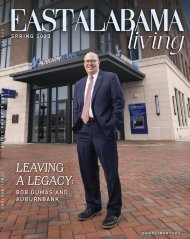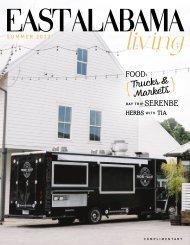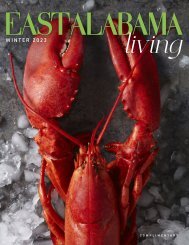You also want an ePaper? Increase the reach of your titles
YUMPU automatically turns print PDFs into web optimized ePapers that Google loves.
she was approached to become executive<br />
director of the Food Bank of East Alabama<br />
in 1995. Martha felt she didn’t know anything<br />
and asked to visit a food bank.<br />
She was sent to the food bank in<br />
Montgomery and was told they could teach<br />
about pest control and food handling but<br />
couldn’t teach her to have a heart for the<br />
work. “That was the one thing I knew,”<br />
Martha says. “I had a strong sense of call,<br />
and I knew if I didn’t take the job, I would be<br />
missing out on something I was supposed<br />
to do. That sense of call has been wonderful<br />
to carry me through some tough times.<br />
“I feel that the work that I am involved<br />
in is mission work just like the mission<br />
work my parents did,” she adds. “Work on<br />
the mission field is responding to a certain<br />
need just as I am responding to a need.”<br />
Needs at the Food Bank are increasing<br />
this fall. The food supply is down with lingering<br />
supply chain issues. Food drives<br />
have not returned to pre-pandemic numbers.<br />
Not only is the Food Bank dealing with<br />
increased prices for food, but substantial<br />
increased transportation costs. Everything<br />
is more expensive.<br />
Some of the additional support that was<br />
available during the pandemic for families<br />
has ended. This affects a family’s ability to<br />
provide food.<br />
“We are incredibly blessed to be in<br />
the community we have,” Martha says,<br />
“because we have had really good support<br />
from the Tallapoosa and Lee County<br />
commission and City of Auburn and City<br />
of Opelika. They have supplied some of<br />
the Covid relief money that we have been<br />
using to purchase additional food. The City<br />
of Auburn has also provided some of their<br />
CARES funds for us to get a truck and fork<br />
lift that really makes a difference.<br />
People often ask Martha the difference<br />
between the Food Bank and food pantries.<br />
“The food bank’s job is to gather together<br />
the best supply of food we can and make<br />
that available to churches and non-profits,”<br />
she says. “When the food comes to us, we<br />
get it into the community. The food pantries<br />
are the ones that actually get food to<br />
people who need it. More than 200 agencies<br />
are imbedded in our community who<br />
know where the people are and how to get<br />
food to those who need it. They are our<br />
heroes.”<br />
Along with food pantries, other places<br />
supplying food include soup kitchens, shelters,<br />
rehab programs and others. “We are<br />
the middle person in the process,” Martha<br />
says. “If someone contacts us or comes in<br />
needing food, we send them to food pantries<br />
closest to them.”<br />
The Food Bank of East Alabama covers<br />
seven counties. Last year nearly five million<br />
pounds of food was distributed, and<br />
an average of 42,450 people were provided<br />
food assistance every month. “Each one<br />
represents a neighbor, whether it is a senior<br />
struggling with health issues or a child out<br />
of school and not having access to school<br />
lunches they are used to having.<br />
“There are families in different kinds<br />
of crises. Food insecurity and poverty are<br />
not the same thing, but they always go<br />
hand and hand. If you find poverty, you are<br />
always going to find levels of food insecurity.<br />
The best benefit of food banks is if we<br />
can get food to people who need it, then<br />
they can use their limited resources toward<br />
paying rent or medical bills.”<br />
Financial support allows the food bank<br />
to purchase the kinds of food needed.<br />
However, it doesn’t provide variety, which<br />
makes food drives more important than<br />
they have been before.<br />
Martha often refers to the quote by<br />
Desmond Tutu, “Do your little bit of good<br />
where you are; it’s these little bits of good<br />
put together that overwhelm the world.”<br />
She points out the difference Kroger in<br />
Opelika and Auburn have made by providing<br />
Food Bank barrels for shoppers to<br />
drop food in as they are leaving the store.<br />
“People think they can’t make a difference<br />
in feeding 57,000,” Martha says “but one<br />
family can help another family by picking<br />
up an extra jar of peanut butter to put in<br />
the barrel, dropping it off at the Food Bank<br />
or one of the food drives. If each one of us<br />
does that, it has a tremendous impact.”<br />
The Food Bank starts programs as needs<br />
are discovered. The backpack programs<br />
for children started because there was a<br />
school nurse who kept seeing children on<br />
Mondays with stomachaches and headaches.<br />
When the nurse talked to the children,<br />
she learned they were eating breakfast<br />
and lunches at school, but they were<br />
not getting enough food on weekends.<br />
Now the food bank backpack program<br />
is in 13 schools in elementary and primary.<br />
Breakfast, lunch and dinner, as well<br />
as snacks, are tucked into backpacks on<br />
Fridays.<br />
The Food Bank also collects for senior<br />
citizens’ boxes. Martha started the brown<br />
bag meals program in 1997 when she found<br />
a lady in Opelika eating canned cat food<br />
92 EAST ALABAMA LIVING













